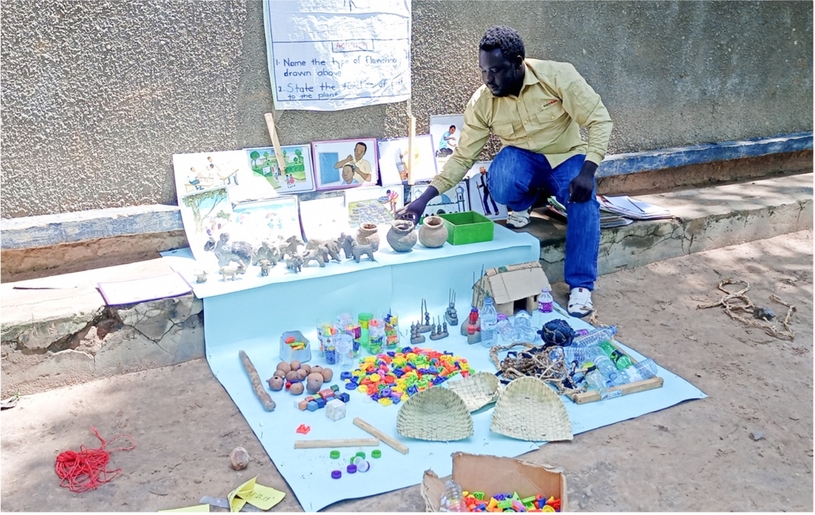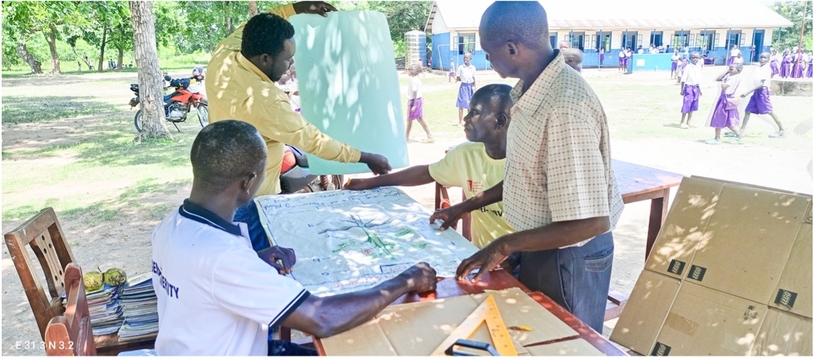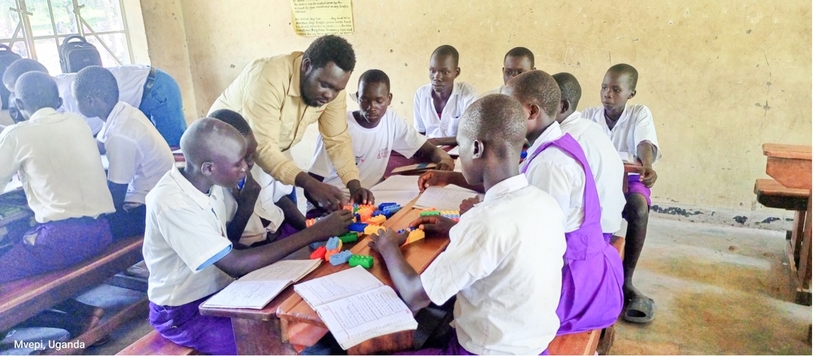Teacher Richard champions locally made teaching and learning materials
Through creativity and passion for teaching and learning, Teacher Richard Munguni is transforming classrooms one at a time with the locally available materials.
Sep 10, 2025

Through creativity and passion for teaching and learning, Teacher Richard Munguni is transforming classrooms one at a time with the locally available materials. His innovative approach is not only elevating learning at his school but also sparking inspiration among educators across the neighbouring schools.
When Teacher Richard Munguni discovered Learning Through Play (LtP), it wasn't just a new teaching method; it sparked a creative revolution in his classroom and beyond. The turning point came when he began crafting locally made teaching and learning materials, an aspect of LtP that has since become his greatest contribution to the PlayMatters journey. From simple bottle tops to repurposed cardboard, Richard’s classroom has become a hub of innovation, where every material tells a story and every object becomes a learning opportunity.
“LtP teaching and learning material making is what transformed everything for me. It’s not just about tools, it’s about bringing learning to life,” he shares passionately.

Teacher Richard displays a variety of learning materials made from local resources, turning simple items like bottle tops, sticks, clay and cardboard into powerful classroom tools.
Meet Teacher Richard Munguni
Richard Munguni is a dedicated teacher at Kiridoaku Primary School in Terego District, with six years of experience in the teaching profession, he currently teaches science in primary six and mathematics in primary seven. His teaching journey has evolved from traditional chalk and board methods to a dynamic, interactive approach that engages learners, largely influenced by the LtP methodology. “When I first heard of PlayMatters, I thought it meant just playing with children. But the training and mentorship helped me understand that it’s about putting the learner at the centre of a classroom,” he reflects.
A Classroom Reimagined
Before LtP, Richard taught using conventional, teacher-centred methods, “chalk and board”. Lessons were rigid and lacked creativity. But with the integration of LtP,and especially through his focus on teaching and learning material production,his classroom was transformed. “I no longer stand in front of the class talking the whole time. I design materials and guide learners to explore them. Now, they discover knowledge themselves,” he explains. By using locally available teaching and learning materials, Richard has turned his lessons into hands-on, minds-on experiences that are easier for learners to understand and remember.
From Teacher to Mentor
What began as personal innovation soon grew into a movement. Richard’s skill in designing effective, low-cost learning materials has earned him recognition beyond his school. “I’ve mentored teachers in schools like Lugbari Primary, Imvepi Primary School, Imvepi ECD and Torit Primary School. LtP Material production is what I emphasize most,it’s where the magic happens,” he says.

Richard is conducting a mentorship session with fellow teachers at his school, Kiridoaku Primary School, demonstrating how to make and use the TLM materials in their lessons.
Igniting Curiosity and Improving Attendance
Richard has observed a remarkable shift in learner behaviours since adopting LtP. Lessons have become more joyful and child-centred, increasing both attendance and engagement. “Learners no longer need to be pushed to attend school. They’re excited to come because learning is fun and practical,”he says.
Vision Beyond the Classroom
Richard’s passion for making materials is not just professional,it’s personal. He envisions turning this skill into a sustainable venture that benefits both himself and the education community. “If I invest in making learning materials as a business, I can support more schools while building a better future for myself,” he shares.
The Need for Shared Understanding
Despite the success of LtP, Richard highlights a critical challenge: a lack of continuous awareness among stakeholders such as parents and education inspectors. “Sometimes inspectors of schools that often come to our school don’t understand the group assessments or the learning through play methodology. They think it’s unserious and a waste of time. There is a need to sensitize everyone so they understand and support what we do,” he explains. He advocates for school-led CPDs, joint teaching and learning material-making sessions with parents, and inclusion of local education officers in LtP training as part of building long-term sustainability.

Pupils at Kiridoku Primary School are enthusiastically engaging with LtP materials during a classroom activity led by Richard.
Play as a Pathway to Purpose
Teacher Munguni Richard is no longer just a teacher,he’s a mentor, innovator, and a beacon of possibility in his community. Through the art of creating with his hands, he’s empowering minds to learn, grow, and dream. “LtP didn’t just improve my teaching, it changed who I am. I now inspire, create, and open doors for learners and fellow teachers to see what’s possible through play.”